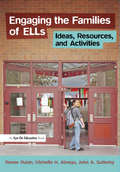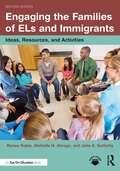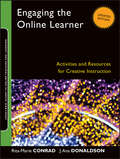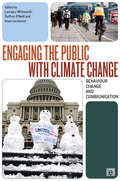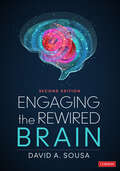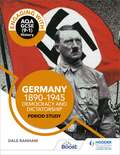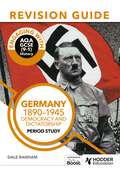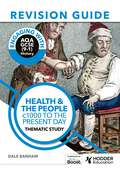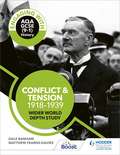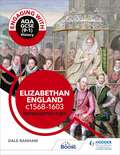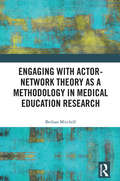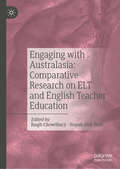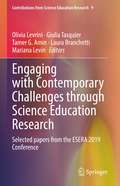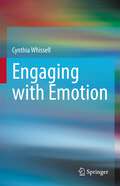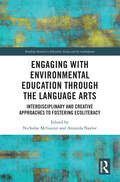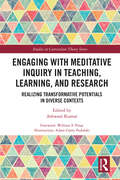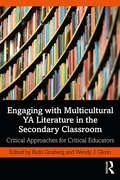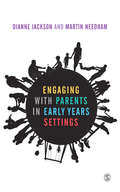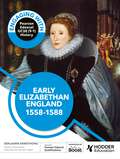- Table View
- List View
Engaging the Families of ELLs: Ideas, Resources, and Activities
by John Sutterby Renee Rubin Michelle AbregoLearn how to involve the diverse families of English language learners with the effective, practical approaches in this book. This must-have resource for teachers and school leaders is packed with fresh ideas geared toward building a partnership between school communities and ELL families. The authors begin each chapter with realistic scenarios that commonly arise with ELL families. They offer activities designed to assess current practices, investigate family perceptions and expectations, overcome challenges, and improve communication. The strategies in this book help you engage families at school and at home in innovative and successful ways. Organized with the busy educator in mind, the book can be read straight through or section by section to best fit your specific needs. As a bonus, every chapter concludes with a wealth of useful resources on every topic! As the demographics of America's schools continue to grow and change, this book guides you to building a school community in which every family can thrive!
Engaging the Families of ELs and Immigrants: Ideas, Resources, and Activities
by John A. Sutterby Renee Rubin Michelle H. AbregoLearn how to engage the diverse families of English learners (ELs) and immigrants with the effective, practical approaches in this book. This must-have resource for teachers and school leaders is packed with fresh ideas geared toward building a partnership between school communities and ELs and immigrant families at school and at home. The book includes information and activities to: Assess current practices Investigate family perceptions and expectations Overcome challenges Improve communication Fund family engagement Fully revised and up-to-date, the new edition shines a much-needed spotlight on immigrant families from numerous homelands and includes a chapter on schools and organizations that have applied many of the ideas in the book for successful partnerships. New online resources include 20 new activities to complement the book chapters, over 50 annotated websites, and additional book recommendations to provide insight into the immigrant experience. The support materials can be found at routledge.com/9780367607548. Organized with the busy educator in mind, the book can be read straight through or section by section to best fit your specific needs. As the demographics of America's schools continue to grow and change, this book guides you to building an inclusive school community in which every family can thrive!
Engaging the Online Learner
by Rita-Marie Conrad J. Ana DonaldsonThis is a revision of the first title in Jossey-Bass' Online Teaching & Learning series. This series helps higher education professionals improve the practice of online teaching and learning by providing concise, practical resources focused on particular areas or issues they might confront in this new learning environment.This revision includes updated activities and resources for instructors teaching online. Based on changes in technology and best practices learned from the field the revision provides new information for even seasoned online instructors.
Engaging the Public with Climate Change: Behaviour Change and Communication
by Lorraine Whitmarsh Irene Lorenzoni Saffron O'NeillDespite increasing public awareness of climate change, our behaviours relating to consumption and energy use remain largely unchanged. This book answers the urgent call for effective engagement methods to foster sustainable lifestyles, community action, and social change. Written by practitioners and academics, the chapters combine theoretical perspectives with case studies and practical guidance, examining what works and what doesn't, and providing transferable lessons for future engagement approaches. Showcasing innovative thought and approaches from around the world, this book is essential reading for anyone working to foster real and lasting behavioural and social change.
Engaging the Rewired Brain
by David A. SousaTechnology is not only affecting students’ brains—it is TRANSFORMING them! In a world where technology is increasingly dominant, it is critical to understand how it affects students′ brains and behavior—for better and for worse. This new edition from bestselling educational neuroscience author David Sousa offers research-based, practical solutions and serves as a framework for educators who want to effectively leverage technology to enhance student learning in an environment that demands constant engagement and stimulation. Inside you’ll discover The impact of technology on students′ brains, including how technology affects cognition, memory, attention, and behavior Strategies for using technology to improve students’ social and emotional skills New information on artificial intelligence, the after-effects of the pandemic, gaming, and productive struggle A glossary of terms and a resources section to connect educators with supplemental materials and information Students are engaging with technology in new ways every day, and educators must shift their instructional practices accordingly. Engaging the Rewired Brain is a must-read for today’s educators and parents striving to understand technology′s impact on the developing brain and prepare today′s learners for an increasingly complex future.
Engaging the Rewired Brain
by David A. SousaTechnology is not only affecting students’ brains—it is TRANSFORMING them! In a world where technology is increasingly dominant, it is critical to understand how it affects students′ brains and behavior—for better and for worse. This new edition from bestselling educational neuroscience author David Sousa offers research-based, practical solutions and serves as a framework for educators who want to effectively leverage technology to enhance student learning in an environment that demands constant engagement and stimulation. Inside you’ll discover The impact of technology on students′ brains, including how technology affects cognition, memory, attention, and behavior Strategies for using technology to improve students’ social and emotional skills New information on artificial intelligence, the after-effects of the pandemic, gaming, and productive struggle A glossary of terms and a resources section to connect educators with supplemental materials and information Students are engaging with technology in new ways every day, and educators must shift their instructional practices accordingly. Engaging the Rewired Brain is a must-read for today’s educators and parents striving to understand technology′s impact on the developing brain and prepare today′s learners for an increasingly complex future.
Engaging with AQA GCSE (91) History: Germany, 18901945: Democracy and dictatorship Period study
by Dale BanhamExam board: AQALevel: GCSESubject: HistoryFirst teaching: September 2016First exams: Summer 2018Make AQA GCSE History more accessible, enjoyable and manageable, equipping students with the depth of knowledge and complex thinking skills required for exam success.Based on his experience of teaching the specification for two years, renowned author Dale Banham uses the latest thinking on memory and visible learning to raise attainment for students of all abilities.- Engage students with accessible routes into challenging topics: the text is broken down into bullet points and boxes, while stories about interesting people start each chapter, providing a memorable 'hook' for revision- Encourage students to take responsibility for their learning: tasks are structured around five 'steps to success', teaching students how to Research, Summarise, Connect, Apply and Review the content- Make learning stick: techniques such as interleaving, retrieval practice, dual coding and spaced practice help students to remember everything and use their knowledge effectively in the exams- Build top-grade skills: the higher-order thinking skills required to construct complex arguments and reach the upper levels of the AQA mark schemes are carefully modelled, with step-by-step advice- Improve exam results: practice questions, revision tips and guidance based on the examiners' reports are embedded throughout the book, alongside purposeful homework activities for each week- Cover the content in one term: a double-page spread for each lesson and a clear pathway through each unit focuses students on what they really need to know, leaving one final term for revision
Engaging with AQA GCSE (9–1) History Revision Guide: Germany, 1890–1945: Democracy and dictatorship
by Dale BanhamThis is not your average revision guide. They just tell you what to revise. This one teaches you how to revise, too, which is the key to exam success.Based on the latest cognitive science principles and illustrated by lots of visual memory aids, this book makes it much easier to remember everything you need to know and avoid feeling overwhelmed.> Start revising the right way. Testing yourself is proven to boost memory, so you will start each chapter by answering a Knowledge Test, to see what you know and where you have gaps.> Spend time on what matters. Having completed the Knowledge Tests, you can plan a really efficient revision programme, which focuses on your weaker topics and will make the biggest difference to your grade.> Close the gaps. The 'Core Content' pages improve your knowledge of the topics that you need to revise. Research proves that we remember something better if it's presented through text and images, so these pages use bullet points and cartoon memory aids to summarise the important knowledge 'takeaways'.> Show what you know. The 'Exam Practice' pages explain what to do with the knowledge you have gained and how to apply it in the exams. Practice questions and exam tips help you to feel confident answering each question type. Compare your answers to the model answers provided, which highlight the features of excellent responses.> Trust the Dale Banham method. Dale is a highly creative History author and a teacher with over 30 years' experience. Building upon the thinking behind his popular 'Engaging with AQA GCSE History' textbooks, the 'steps to success' in this book give students more support than any other revision guide.
Engaging with AQA GCSE (9–1) History Revision Guide: Germany, 1890–1945: Democracy and dictatorship
by Dale BanhamThis is not your average revision guide. They just tell you what to revise. This one teaches you how to revise, too, which is the key to exam success.Based on the latest cognitive science principles and illustrated by lots of visual memory aids, this book makes it much easier to remember everything you need to know and avoid feeling overwhelmed.> Start revising the right way. Testing yourself is proven to boost memory, so you will start each chapter by answering a Knowledge Test, to see what you know and where you have gaps.> Spend time on what matters. Having completed the Knowledge Tests, you can plan a really efficient revision programme, which focuses on your weaker topics and will make the biggest difference to your grade.> Close the gaps. The 'Core Content' pages improve your knowledge of the topics that you need to revise. Research proves that we remember something better if it's presented through text and images, so these pages use bullet points and cartoon memory aids to summarise the important knowledge 'takeaways'.> Show what you know. The 'Exam Practice' pages explain what to do with the knowledge you have gained and how to apply it in the exams. Practice questions and exam tips help you to feel confident answering each question type. Compare your answers to the model answers provided, which highlight the features of excellent responses.> Trust the Dale Banham method. Dale is a highly creative History author and a teacher with over 30 years' experience. Building upon the thinking behind his popular 'Engaging with AQA GCSE History' textbooks, the 'steps to success' in this book give students more support than any other revision guide.
Engaging with AQA GCSE (9–1) History Revision Guide: Health and the people, c1000 to the present day
by Dale BanhamThis is not your average revision guide. They just tell you what to revise. This one teaches you how to revise, too, which is the key to exam success.Based on the latest cognitive science principles and illustrated by lots of visual memory aids, this book makes it much easier to remember everything you need to know and avoid feeling overwhelmed.> Start revising the right way. Testing yourself is proven to boost memory, so you will start each chapter by answering a Knowledge Test, to see what you know and where you have gaps.> Spend time on what matters. Having completed the Knowledge Tests, you can plan a really efficient revision programme, which focuses on your weaker topics and will make the biggest difference to your grade.> Close the gaps. The 'Core Content' pages improve your knowledge of the topics that you need to revise. Research proves that we remember something better if it's presented through text and images, so these pages use bullet points and cartoon memory aids to summarise the important knowledge 'takeaways'.> Show what you know. The 'Exam Practice' pages explain what to do with the knowledge you have gained and how to apply it in the exams. Practice questions and exam tips help you to feel confident answering each question type. Compare your answers to the model answers provided, which highlight the features of excellent responses.> Trust the Dale Banham method. Dale is a highly creative History author and a teacher with over 30 years' experience. Building upon the thinking behind his popular 'Engaging with AQA GCSE History' textbooks, the 'steps to success' in this book give students more support than any other revision guide.
Engaging with AQA GCSE (9–1) History Revision Guide: Health and the people, c1000 to the present day
by Dale BanhamThis is not your average revision guide. They just tell you what to revise. This one teaches you how to revise, too, which is the key to exam success.Based on the latest cognitive science principles and illustrated by lots of visual memory aids, this book makes it much easier to remember everything you need to know and avoid feeling overwhelmed.> Start revising the right way. Testing yourself is proven to boost memory, so you will start each chapter by answering a Knowledge Test, to see what you know and where you have gaps.> Spend time on what matters. Having completed the Knowledge Tests, you can plan a really efficient revision programme, which focuses on your weaker topics and will make the biggest difference to your grade.> Close the gaps. The 'Core Content' pages improve your knowledge of the topics that you need to revise. Research proves that we remember something better if it's presented through text and images, so these pages use bullet points and cartoon memory aids to summarise the important knowledge 'takeaways'.> Show what you know. The 'Exam Practice' pages explain what to do with the knowledge you have gained and how to apply it in the exams. Practice questions and exam tips help you to feel confident answering each question type. Compare your answers to the model answers provided, which highlight the features of excellent responses.> Trust the Dale Banham method. Dale is a highly creative History author and a teacher with over 30 years' experience. Building upon the thinking behind his popular 'Engaging with AQA GCSE History' textbooks, the 'steps to success' in this book give students more support than any other revision guide.
Engaging with AQA GCSE (9–1) History: Conflict and tension, 1918–1939 Wider world depth study
by Dale Banham Matthew Fearns-DaviesExam board: AQALevel: GCSESubject: HistoryFirst teaching: September 2016First exams: Summer 2018Make AQA GCSE History more accessible, enjoyable and manageable.Based on his own experience of teaching the specification, renowned author Dale Banham knows how to cover the content with the right pace and depth, while also equipping students with the knowledge and 'complex thinking' skills required for exam success.Using the latest research on memory and visible learning, this textbook will help to raise attainment for students of all abilities.- Engage students with accessible routes into challenging topics: the text is broken down into bullet points and boxes, while stories about interesting people start each chapter, providing a memorable 'hook' for revision- Encourage students to take responsibility for their learning: tasks are structured around five 'steps to success', teaching students how to Research, Summarise, Connect, Apply and Review the content- Make learning stick: techniques such as interleaving, retrieval practice, dual coding and spaced practice help students to remember everything and use their knowledge effectively in the exams- Build top-grade skills: the higher-order thinking skills required to construct complex arguments and reach the upper levels of the AQA mark schemes are carefully modelled, with step-by-step advice- Improve exam results: practice questions, revision tips and guidance based on the examiners' reports are embedded throughout the book, alongside purposeful homework activities for each week- Cover the content in one term: a double-page spread for each lesson and a clear pathway through each unit focuses students on what they really need to know, leaving one final term for revisionThe five-term plan is provided FREE for teachers in the Free schemes of work and lesson resources (available on the Dynamic Learning platform), along with editable resources that support the tasks in the textbooks and guidance on using homework effectively.
Engaging with AQA GCSE (9–1) History: Conflict and tension, 1918–1939 Wider world depth study
by Dale Banham Matthew Fearns-DaviesExam board: AQALevel: GCSESubject: HistoryFirst teaching: September 2016First exams: Summer 2018Make AQA GCSE History more accessible, enjoyable and manageable.Based on his own experience of teaching the specification, renowned author Dale Banham knows how to cover the content with the right pace and depth, while also equipping students with the knowledge and 'complex thinking' skills required for exam success.Using the latest research on memory and visible learning, this textbook will help to raise attainment for students of all abilities.> Engage students with accessible routes into challenging topics. The text is broken down into bullet points and boxes, while stories about interesting people start each chapter, providing a memorable 'hook' for revision> Encourage students to take responsibility for their learning. Tasks are structured around five 'steps to success', teaching students how to Research, Summarise, Connect, Apply and Review the content> Make learning stick. Techniques such as interleaving, retrieval practice, dual coding and spaced practice help students to remember everything and use their knowledge effectively in the exams> Build top-grade skills. The higher-order thinking skills required to construct complex arguments and reach the upper levels of the AQA mark schemes are carefully modelled, with step-by-step advice> Improve exam results. Practice questions, revision tips and guidance based on the examiners' reports are embedded throughout the book, alongside purposeful homework activities for each week> Cover the content in one term. A double-page spread for each lesson and a clear pathway through each unit focuses students on what they really need to know, leaving one final term for revisionThe five-term plan is provided FREE online at hoddereducation.co.uk/engaging, along with editable resources that support the tasks in the textbooks and guidance on using homework effectively.
Engaging with AQA GCSE (9–1) History: Elizabethan England, c1568–1603 British depth study
by Dale BanhamExam board: AQALevel: GCSESubject: HistoryFirst teaching: September 2016First exams: Summer 2018Make AQA GCSE History more accessible, enjoyable and manageable.Based on his own experience of teaching the specification, renowned author Dale Banham knows how to cover the content with the right pace and depth, while also equipping students with the knowledge and 'complex thinking' skills required for exam success.Using the latest research on memory and visible learning, this textbook will help to raise attainment for students of all abilities.- Engage students with accessible routes into challenging topics: the text is broken down into bullet points and boxes, while stories about interesting people start each chapter, providing a memorable 'hook' for revision- Encourage students to take responsibility for their learning: tasks are structured around five 'steps to success', teaching students how to Research, Summarise, Connect, Apply and Review the content- Make learning stick: techniques such as interleaving, retrieval practice, dual coding and spaced practice help students to remember everything and use their knowledge effectively in the exams- Build top-grade skills: the higher-order thinking skills required to construct complex arguments and reach the upper levels of the AQA mark schemes are carefully modelled, with step-by-step advice- Improve exam results: practice questions, revision tips and guidance based on the examiners' reports are embedded throughout the book, alongside purposeful homework activities for each week- Cover the content in one term: a double-page spread for each lesson and a clear pathway through each unit focuses students on what they really need to know, leaving one final term for revisionThe five-term plan is provided FREE for teachers in the Free schemes of work and lesson resources (available on the Dynamic Learning platform), along with editable resources that support the tasks in the textbooks and guidance on using homework effectively.
Engaging with AQA GCSE (9–1) History: Elizabethan England, c1568–1603 British depth study
by Dale BanhamExam board: AQALevel: GCSESubject: HistoryFirst teaching: September 2016First exams: Summer 2018Make AQA GCSE History more accessible, enjoyable and manageable.Based on his own experience of teaching the specification, renowned author Dale Banham knows how to cover the content with the right pace and depth, while also equipping students with the knowledge and 'complex thinking' skills required for exam success.Using the latest research on memory and visible learning, this textbook will help to raise attainment for students of all abilities.> Engage students with accessible routes into challenging topics. The text is broken down into bullet points and boxes, while stories about interesting people start each chapter, providing a memorable 'hook' for revision> Encourage students to take responsibility for their learning. Tasks are structured around five 'steps to success', teaching students how to Research, Summarise, Connect, Apply and Review the content> Make learning stick. Techniques such as interleaving, retrieval practice, dual coding and spaced practice help students to remember everything and use their knowledge effectively in the exams> Build top-grade skills. The higher-order thinking skills required to construct complex arguments and reach the upper levels of the AQA mark schemes are carefully modelled, with step-by-step advice> Improve exam results. Practice questions, revision tips and guidance based on the examiners' reports are embedded throughout the book, alongside purposeful homework activities for each week> Cover the content in one term. A double-page spread for each lesson and a clear pathway through each unit focuses students on what they really need to know, leaving one final term for revisionThe five-term plan is provided FREE online at hoddereducation.co.uk/engaging, along with editable resources that support the tasks in the textbooks and guidance on using homework effectively.
Engaging with AQA GCSE (9–1) History: Germany, 1890–1945: Democracy and dictatorship Period study
by Dale BanhamExam board: AQALevel: GCSESubject: HistoryFirst teaching: September 2016First exams: Summer 2018Make AQA GCSE History more accessible, enjoyable and manageable.Based on his own experience of teaching the specification, renowned author Dale Banham knows how to cover the content with the right pace and depth, while also equipping students with the knowledge and 'complex thinking' skills required for exam success.Using the latest research on memory and visible learning, this textbook will help to raise attainment for students of all abilities.> Engage students with accessible routes into challenging topics. The text is broken down into bullet points and boxes, while stories about interesting people start each chapter, providing a memorable 'hook' for revision> Encourage students to take responsibility for their learning. Tasks are structured around five 'steps to success', teaching students how to Research, Summarise, Connect, Apply and Review the content> Make learning stick. Techniques such as interleaving, retrieval practice, dual coding and spaced practice help students to remember everything and use their knowledge effectively in the exams> Build top-grade skills. The higher-order thinking skills required to construct complex arguments and reach the upper levels of the AQA mark schemes are carefully modelled, with step-by-step advice> Improve exam results. Practice questions, revision tips and guidance based on the examiners' reports are embedded throughout the book, alongside purposeful homework activities for each week> Cover the content in one term. A double-page spread for each lesson and a clear pathway through each unit focuses students on what they really need to know, leaving one final term for revisionThe five-term plan is provided FREE online at hoddereducation.co.uk/engaging, along with editable resources that support the tasks in the textbooks and guidance on using homework effectively.
Engaging with Actor-Network Theory as a Methodology in Medical Education Research (Routledge Research in Education)
by Bethan MitchellThis book outlines a methodology based on actor-network theory (ANT) and praxiography and applies this to the field of medical education. Drawn from a detailed account of practice in a medical setting, this book shows how researchers in education and medical education can learn to work with ANT approaches and attune to different insights in practice. The book gives a detailed account of what actor-network theory can bring to research, through the investigation of social and material networks. The philosophical underpinnings of actor-network theory are presented as the basis of this emerging methodology, through an exploration of learning as disruption, practice as human and material assemblages, and power as regulated difference in worlds of practice. This is a qualitative approach for exploring complexity that does not attempt to represent or reduce but allows for unique insights into practice that might otherwise be overlooked. With a robust grounding in practice and professional learning and actor-network theory, this book will be of great interest for academics, scholars, and postgraduate students in the field of research methods and medical education.
Engaging with Australasia: Comparative Research on ELT and English Teacher Education
by Raqib Chowdhury Huynh Anh TuanThe book showcases collaborative intercultural research into English language teaching and English language teacher education across Australasia covering a broad range of topics from English education policies, curricular reform and practices, teacher professional development, and teacher and student identities. Together, the selected studies showcase how, in the shadow of the Pandemic, newer configurations in developing Asian and South-East Asian countries have complicated collaboration in teaching and research and how these contrast with practices in Australia. In particular, the studies highlight the need for both cultural and pedagogical adaptations in practitioners’ engagement with both policy and pedagogy. The book finds interested readership among emerging educators including graduate and doctoral researchers, as well as educators and policymakers.
Engaging with Contemporary Challenges through Science Education Research: Selected papers from the ESERA 2019 Conference (Contributions from Science Education Research #9)
by Tamer G. Amin Olivia Levrini Mariana Levin Giulia Tasquier Laura BranchettiThis book starts with the premise that beauty can be an engine of transformation and authentic engagement in an increasingly complex world. It presents an organized picture of highlights from the 13th European Science Education Research Association Conference, ESERA 2019, held in Bologna, Italy. The collection includes contributions that discuss contemporary issues such as climate change, multiculturalism, and the flourishing of new interdisciplinary areas of investigation, including the application of cognitive neuroscience, artificial intelligence, and digital humanities to science education research. It also highlights learners’ difficulties engaging with socio-scientific issues in a digital and post-truth era. The volume demonstrates that deepening our understanding is the preferred way to address these challenges and that science education has a key role to play in this effort. In particular, the book advances the argument that the deep and novel character of these challenges requires a collective search for new narratives and languages, an expanding knowledge base and new theoretical perspectives and methods of research. The book provides a contemporary picture of science education research and looks to the theoretical and practical societal challenges of the future.
Engaging with Emotion
by Cynthia WhissellThis work informs by encouraging the reader to interact with the text itself and with the literature in the area. It is a learning tool rather than an encyclopaedic presentation of its topic. The writing style is personal, direct and accessible. Citations are employed, but always for specific purposes. Cited materials are made accessible whenever possible by the provision of URLs. Readers learn about emotion and its relationship to brain, body, cognition, memory, and appraisal. They are also introduced to the role of emotion in language and in the fine arts. Readers of Engaging with Emotion will likely be students within the first two years of university or college taking a related course, or those who are interested in learning more about emotion. This book is ideal for adaptation to an online course format as it includes exercises and learning guides. The book uses straightforward and helpful language and examples to avoid frustrating or confusing students, but instead to keep them actively involved with the material in the book, and to help motivated learners learn.
Engaging with Environmental Education through the Language Arts: Interdisciplinary and Creative Approaches to Fostering Ecoliteracy (Routledge Research in Education, Society and the Anthropocene)
by Nicholas McGuinn and Amanda NaylorThis creative volume demonstrates the urgent importance of engaging students cognitively and affectively with the climate crisis and environmental education, underpinning the vital role the language arts play in expanding this engagement for a better future.Moving beyond the basic modalities of English, chapters written by an internationally diverse group of contributors advocate for the integration of language arts with environmental education through broad representation of creative subdisciplines: drama, visual literacy, philosophy, poetry, student voice and more. These subdisciplines are explored to suggest the context in which environmental degradation, forest ecologies, carbon literacy and indigenous knowledges are taught, further helping students to develop a comprehensive view of how they can effect change. Ultimately, the book makes a compelling argument by emphasising the significance of interdisciplinary learning in fostering a holistic understanding of environmental issues.This volume will appeal to scholars, researchers and postgraduate students in the field of environmental and sustainability education, English and literacy/language arts and teacher education more broadly. Undergraduate students, policymakers, environmental educators and curriculum designers may also benefit from this volume.
Engaging with Meditative Inquiry in Teaching, Learning, and Research: Realizing Transformative Potentials in Diverse Contexts (Studies in Curriculum Theory Series)
by Ashwani Kumar Adam Garry PodolskiThis collection of multi/inter-disciplinary essays explores the transformative potential of Ashwani Kumar’s work on meditative inquiry – a holistic approach to teaching, learning, researching, creating, and living – in diverse educational contexts. Aspiring to awaken awareness, intelligence, compassion, collaboration, and aesthetic sensibility among students and their teachers through self-reflection, critique, dialogue, and creative exploration, this volume: Showcases unique ways in which scholars from diverse disciplinary, cultural, and geographic contexts have engaged with meditative inquiry in their own fields. Provides a space where African, Asian, Buddhist, Indigenous, and Western scholars engage with the idea of meditative inquiry from their own cultural, philosophical, and spiritual traditions, perspectives, and practices. Explores a variety of themes in relation to meditative inquiry including arts-based research, poetic inquiry, Africentricity, Indigenous thinking, martial arts, positive psychology, trauma, dispute resolution, and critical discourse analysis. Offers insights into how the principles of meditative inquiry can be incorporated in classrooms and, thereby, contributes to the growing interest in mindfulness, meditation, and other holistic approaches in schools and academia. The diverse and rich contributions contained in this volume offer valuable perspectives and practices for scholars, students, and educators interested in exploring and adopting the principles of meditative inquiry in their specific fields and contexts.
Engaging with Multicultural YA Literature in the Secondary Classroom: Critical Approaches for Critical Educators
by Ricki Ginsberg Wendy J. GlennWith a focus on fostering democratic, equitable education for young people, Ginsberg and Glenn’s engaging text showcases a wide variety of innovative, critical classroom approaches that extend beyond traditional literary theories commonly used in K-12 and higher education classrooms and provides opportunities to explore young adult (YA) texts in new and essential ways. The chapters pair YA texts with critical practices and perspectives for culturally affirming and sustaining teaching and include resources, suggested titles, and classroom strategies. Following a consistent structure, each chapter provides foundational background on a key critical approach, applies the approach to a focal YA text, and connects the approach to classroom strategies designed to encourage students to think deeply and critically about texts, themselves, and the world. Offering a wealth of innovative pedagogical tools, this comprehensive volume offers opportunities for students and their teachers to explore key and emerging topics, including culture, (dis)ability, ethnicity, gender, immigration, race, sexual orientation, and social class.
Engaging with Parents in Early Years Settings
by Martin Needham Dianne Jackson'It is inspiring to see a text which attempts to shift our worldview. This shift could give us the chance to achieve more open, inclusive, democratic early childhood practice that has the capacity to answer the deeper questions and which sees both parents and children as powerful and positive agents in their own futures' - Chris Pascal and Tony Bertram, Directors of the Centre for Research in Early Childhood (CREC) The role of parents in the early years is fundamental. In order to achieve the best outcomes for children, mutually beneficial relationships between parents and practitioners need to underpin children's care and learning. There are many services for children and many different settings in which care and education can take place. Whether you work in children's centres, outreach and dual-focused services, preschools, kindergartens or schools this book will help you develop the skills and strategies to work alongside parents whatever your role. Focussing on: The importance of involving parents The nature of learning How to engage and build relationships with parents How to reflect on and develop shared learning environment in settings Transitions and attachment This book has examples taken from real settings and practical advice to help you put the ideas into practice. Reading and using it will help ensure the wellbeing and development of all children in your care. Dianne Jackson is an Adjunct Fellow at the University of Western Sydney and the CEO of Connect Child and Family Services Martin Needham is Academic Division Leader: Education, Professional and Community Studies at Manchester Metropolitan University
Engaging with Pearson Edexcel GCSE (9-1) History: Early Elizabethan England, 1558-88
by Ben ArmstrongTrust the power of cognitive science to help students to understand more, remember more and feel more confident about their exams.This textbook is guaranteed to make learning more effective. The approach was created by author and teacher Dale Banham, who has amazing knowledge of the best teaching methods and over 30 years' classroom experience.> Simplify each topic. The text is broken down into bullet points and boxes. Tasks are structured around the 'steps to success', teaching students how to Connect & Engage, Research & Record, Summarise, Apply and Review their learning> Make learning stick. Cognitive science techniques such as 'interleaving', 'retrieval practice' and 'spaced practice' support students with processing and remembering the course content> Strengthen memory through 'dual coding'. The book contains memory aids that visually summarise key knowledge. Research proves that we remember something better if it's presented through text and images> Improve exam results. The exam skills required to answer each question type successfully are carefully explained. Practice questions, revision tips and guidance based on the examiners' reports are also included> Trust the academic seal of approval. This book has been reviewed by a historian who specialises in the topic, to ensure that the historiography is accurate and up to date
